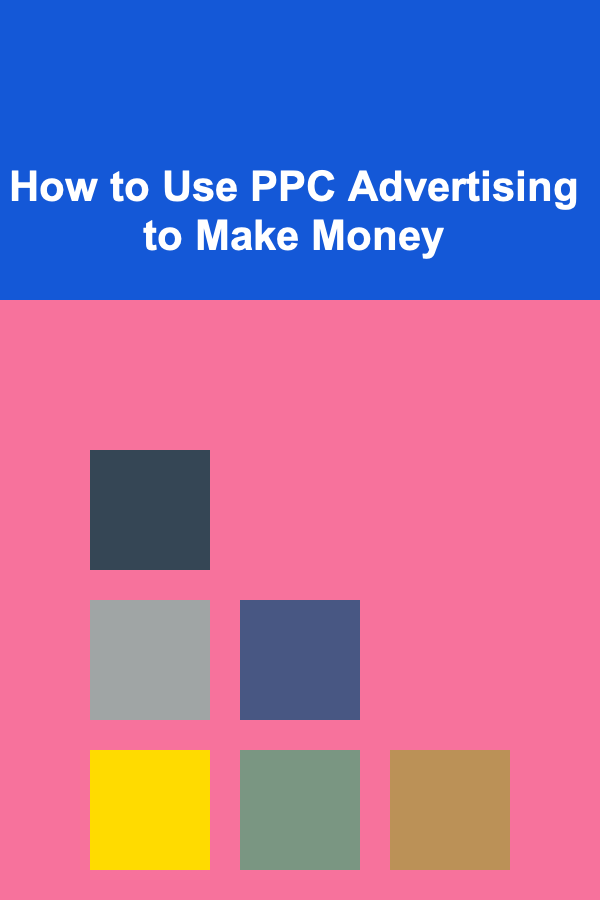
How to Use PPC Advertising to Make Money
ebook include PDF & Audio bundle (Micro Guide)
$12.99$9.99
Limited Time Offer! Order within the next:

Pay-Per-Click (PPC) advertising is one of the most effective and widely-used forms of digital marketing today. From small businesses to large corporations, PPC advertising provides opportunities to generate revenue by driving targeted traffic to your website. By understanding the principles of PPC, how it works, and the various strategies for optimizing it, you can harness its potential to make money. In this article, we will dive into the essentials of PPC advertising, explore how it works, and offer actionable steps you can take to leverage it for financial success.
What is PPC Advertising?
PPC advertising is a model of online marketing where advertisers pay a fee each time their ad is clicked. Instead of earning impressions or shares, the goal is to drive traffic to a website and convert that traffic into sales, leads, or other valuable actions.
Unlike traditional advertising, where you pay for the placement or visibility of an ad, PPC allows you to pay only for actual engagement---clicks. This makes PPC a highly efficient way to market products or services. The most common platforms for PPC are Google Ads, Bing Ads, and social media platforms like Facebook, Instagram, and LinkedIn.
The Main Components of PPC:
- Keywords: These are the terms or phrases that users enter into search engines. When someone searches for a keyword you're targeting, your ad may appear.
- Ad Copy: This is the content of the ad, typically consisting of a headline, description, and URL that users see when they encounter your ad.
- Landing Page: The page that users are directed to after clicking on your ad. It should be relevant to the ad and optimized for conversions.
- Bid: The amount you're willing to pay for a click on your ad. The higher the bid, the more likely your ad is to appear in a favorable position.
- Ad Rank: The position of your ad on the search results page. It's determined by your bid, quality score, and other factors.
Why PPC Advertising is an Effective Way to Make Money
PPC advertising offers several advantages over traditional and other forms of online marketing. Here are some reasons why it is a powerful tool for generating revenue:
a. Immediate Results
One of the biggest advantages of PPC advertising is that it generates instant traffic to your website. Unlike SEO (Search Engine Optimization), which can take months to yield results, PPC allows you to drive traffic to your site as soon as your campaign goes live.
b. Targeted Traffic
PPC allows for highly targeted advertising. You can choose keywords, demographics, locations, devices, times, and even audiences based on their behavior. This means you are putting your ads in front of people who are more likely to convert, thereby increasing the chances of making money.
c. Measurable ROI
Unlike traditional advertising, PPC campaigns offer precise tracking. You can measure exactly how much you spend, how much traffic you get, and how many conversions you achieve. This transparency makes it easier to calculate your Return on Investment (ROI) and optimize your campaigns for better results.
d. Budget Control
With PPC, you can set a daily or monthly budget, giving you complete control over how much you spend. This is particularly beneficial for small businesses and startups, as it allows them to test the waters and scale their campaigns based on performance.
e. Scalability
PPC campaigns can be easily scaled. Once you find an ad strategy that works, you can increase your budget to reach more people and generate more traffic. This scalability is one of the reasons why large businesses rely heavily on PPC to drive their marketing efforts.
How PPC Works
PPC works by auctioning ads based on certain factors such as the advertiser's bid and the relevance of the ad. The two most popular PPC platforms, Google Ads and Facebook Ads, operate on slightly different models, but both share key principles.
Google Ads: Search Engine Advertising
Google Ads is the most widely used PPC platform, allowing advertisers to display ads on Google search results pages. Here's a step-by-step breakdown of how it works:
- Keyword Selection: Advertisers select keywords that are relevant to their product or service. These keywords are what potential customers might type into Google when looking for similar offerings.
- Bid on Keywords: Advertisers place bids on those keywords. The bid represents the maximum amount an advertiser is willing to pay for a click on their ad.
- Ad Auction: When a user performs a search, Google runs an auction to determine which ads will appear and in what order. The winner is determined by a combination of factors, including the bid and the relevance of the ad to the user's search.
- Ad Placement: The winning ads are shown in search results, either at the top or on the side of the page.
- Cost-Per-Click: The advertiser is charged each time a user clicks on the ad, which is the "pay-per-click" aspect of PPC.
Facebook Ads: Social Media Advertising
Facebook Ads works differently than search engine PPC. Instead of targeting keywords, Facebook allows advertisers to target users based on demographics, interests, behaviors, and location. Here's how Facebook Ads work:
- Audience Selection: Advertisers define their target audience using Facebook's targeting options, which include age, gender, location, interests, and more.
- Ad Creation: Advertisers create visually engaging ads that may include images, videos, and a call to action (CTA).
- Ad Placement: Facebook offers several placement options, including the News Feed, Stories, and the right-hand column on desktop. Ads can be shown to users within these placements based on the advertiser's targeting.
- Cost-Per-Click/Impression: Like Google Ads, advertisers pay when a user clicks on the ad (CPC) or when the ad is shown (CPM).
PPC Strategies to Make Money
To maximize the potential of PPC advertising, you need to implement effective strategies that align with your business goals. Here are some key strategies for making money through PPC:
a. Keyword Research and Optimization
Keyword research is one of the most important aspects of PPC advertising. By selecting the right keywords, you can ensure that your ads appear in front of the right audience. Here are some tips for successful keyword research:
- Use Google Keyword Planner: Google's Keyword Planner tool helps identify relevant keywords and their search volume.
- Long-Tail Keywords: Targeting long-tail keywords (specific phrases with lower competition) can help reduce costs and bring in highly targeted traffic.
- Negative Keywords: Use negative keywords to filter out irrelevant traffic and ensure that you only pay for clicks that are likely to convert.
b. Crafting Compelling Ad Copy
Your ad copy plays a crucial role in driving clicks. To craft compelling ads, consider the following:
- Clear and Concise Headlines: The headline should clearly convey the value proposition and entice users to click.
- Use of Strong CTAs: A strong call-to-action (CTA) encourages users to take the next step, whether it's making a purchase, signing up, or learning more.
- Ad Extensions: Use ad extensions to provide additional information, such as site links, phone numbers, or customer reviews. This can increase the visibility of your ad and improve its CTR (Click-Through Rate).
c. A/B Testing
A/B testing allows you to test different variations of your ads to see which performs best. You can test:
- Ad Copy: Test different headlines and descriptions to see what resonates with your audience.
- Landing Pages: Try different versions of your landing page to see which one converts better.
- Bidding Strategies: Experiment with different bidding strategies (manual vs. automated) to determine the most cost-effective approach.
d. Landing Page Optimization
After a user clicks on your ad, they should be directed to a landing page that is relevant to the ad and optimized for conversion. A poorly designed landing page can lead to high bounce rates and wasted ad spend. Here's how to optimize your landing page:
- Consistency: Ensure that the message on the landing page aligns with the ad. A user should immediately recognize that they landed on the correct page.
- Clear CTA: The landing page should have a clear, visible CTA that guides the user to the desired action, whether it's purchasing, subscribing, or filling out a form.
- Fast Loading Speed: Slow-loading pages can lead to high bounce rates. Ensure your page loads quickly on both desktop and mobile devices.
e. Budget and Bid Management
Proper budget and bid management is crucial for optimizing the profitability of your PPC campaigns. Here are some tips:
- Set a Daily or Monthly Budget: Determine how much you are willing to spend per day or month on your PPC campaigns.
- Monitor Bids: Regularly review your bids and adjust them based on the performance of your ads. Higher bids generally result in better ad positions.
- Use Automated Bidding: Platforms like Google Ads offer automated bidding strategies that help you maximize conversions or clicks within your budget.
Measuring and Optimizing PPC Performance
To make money with PPC advertising, you need to track and analyze the performance of your campaigns. Here are some important metrics to monitor:
- Click-Through Rate (CTR): The percentage of people who click on your ad after seeing it. A high CTR indicates that your ad is relevant and compelling.
- Conversion Rate: The percentage of visitors who take a desired action, such as making a purchase or filling out a form. A higher conversion rate leads to a better ROI.
- Cost Per Conversion: The amount you pay for each conversion. Lowering this cost is key to maximizing profitability.
- Quality Score: Google Ads assigns a quality score to your keywords and ads based on relevance, landing page experience, and CTR. A higher quality score can lead to lower costs and better ad placement.
Conclusion
PPC advertising is a powerful way to drive targeted traffic and generate revenue. By strategically selecting keywords, crafting compelling ads, optimizing landing pages, and continuously measuring performance, you can leverage PPC to achieve financial success. Remember that PPC advertising requires ongoing optimization, so be prepared to test, iterate, and refine your campaigns for maximum effectiveness. Whether you are a small business owner or a large enterprise, PPC can be a highly profitable avenue for making money in the digital age.

Building Community: Strategies and Techniques for a Thriving Community Manager
Read More
How to Encourage Continuous Learning and Development in Your Team
Read More
How to Make Money Online as a Veterinarian: 10 Actionable Ideas
Read More
How to Manage Passwords Safely with a Password Manager
Read More
Why A Tidy Living Room Invites Relaxation
Read More
How to Master Speaking at Community Events
Read MoreOther Products

Building Community: Strategies and Techniques for a Thriving Community Manager
Read More
How to Encourage Continuous Learning and Development in Your Team
Read More
How to Make Money Online as a Veterinarian: 10 Actionable Ideas
Read More
How to Manage Passwords Safely with a Password Manager
Read More
Why A Tidy Living Room Invites Relaxation
Read More